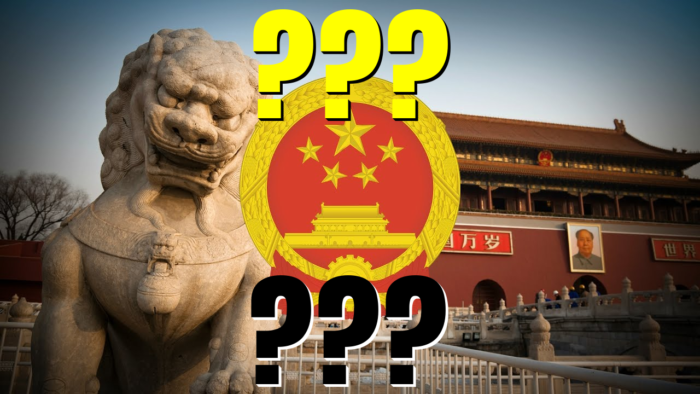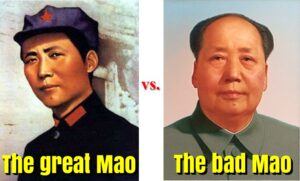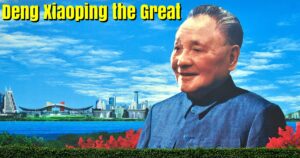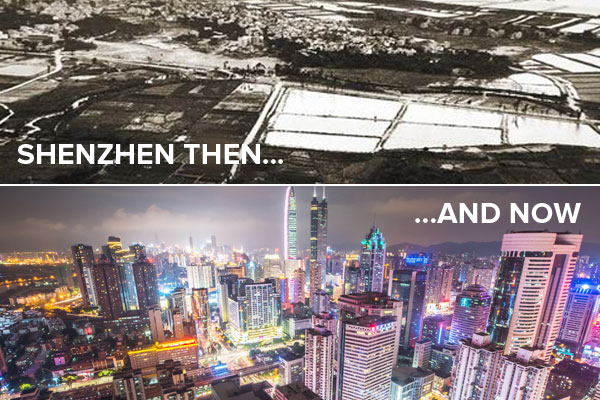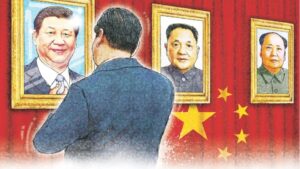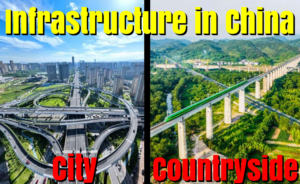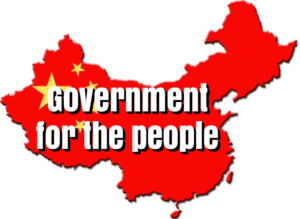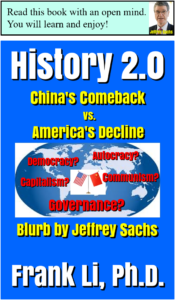The People’s Republic of China (PRC) was born on October 1, 1949, as the result of the Chinese Communist Revolution (What is the Chinese Communist Revolution, anyway?). Its life can be simply divided into three periods as follows:
Let me highlight each …
1. Mao’s era
Mao Zedong unified China in 1949, thus ending the century of humiliation. For that alone, Mao should be highly regarded in history. In other words, without Mao, there would have been no PRC.
Unfortunately for China, like many great military leaders in history, Mao was great at grabbing power [by force], but totally inadequate at governing. As a result, the PRC under him (1949-1976) was nearly a total disaster.
Specifically, Mao made three huge mistakes:
- He thoroughly destroyed capitalism in China. As a result, China became dirt poor, so poor that a young man like me (born in 1959) thought of nothing but “getting the hell out of here”. I did that in 1982, as did many who could. For more, read My American Dream Has Come True!
- He blindly embraced the Mother Heroine campaign by the USSR after WWII, which encouraged women to have many children. As a result, China’s population ballooned, growing from 540 million in 1949 to 953 million in 1976, on the way to exploding to nearly 1.3 billion by the year 2000. This would be similar to being a poor family with 10 kids in Africa today – You will never see the light of the day!
- He severely damaged China with several political campaigns, such as (1) the Great Leap Forward, which led to the Great Chinese Famine, and (2) the Cultural Revolution, which led to the greatest destruction of a nation’s culture and morality in human history.
However, China under Mao did have some significant achievements. Two examples:
- Literacy: Read 1949 The Education Revolution Begins in China.
- Life expectancy: See chart below.
The increased literacy played a significant role in China’s comeback: China had a reasonably well-educated workforce before Deng’s era began.
2. Deng’s era
Mao died in 1976. Then China changed fundamentally and significantly, thanks to one wise leader: Deng Xiaoping.
Deng was a dictator. But not all dictators are bad for their countries! Deng used his power wisely for the good of his country – He peacefully transformed China, not only economically (i.e., capitalism), but also politically (i.e., “state capitalism”), which has led to China’s overwhelming success over the past few decades. China surpassed America in PPP (Purchasing Power Parity) in 2014, and will almost certainly surpass America in GDP by 2040 (BBC: Chinese economy to overtake US ‘by 2028’ due to Covid).
What is the secret behind China’s success?
Aside from embracing capitalism, China did two extraordinary things:
- Focused on the economy, without blindly embracing democracy as Russia did after the disintegration of the USSR. Any doubt about the benefits of not rushing to democracy blindly? Compare Russia with China today – They are decades apart in economic development!
- Adopted a one-child policy. Otherwise, China’s population today would likely be double her present 1.3 billion. Any doubt about the benefits of population control? Compare India with China today – They are decades apart in economic development!
Both of the above were highly controversial, not only at home but also abroad, especially in the West. However, they proved to be the right things to do for China at the time for one simple reason: survival, idealistic human rights notwithstanding!
The image below offers one prominent example of China’s amazing transformation: Shenzhen from a fishing village to the “city of the future” (aka “China’s Silicon Valley”), because of its hi-tech “everything” (Why retailers everywhere should look to China).
3. Xi’s era
Xi became the CPC’s General Secretary in November 2012. Below is an excerpt from my first book (published in December 2012), highlighting Xi’s importance, ranking him at the same level as Deng and Mao.
How has Xi been doing since then?
Very well, overall.
Specifically, two highlights:
- In contrast to his predecessor Hu Jintao, who fashioned an off-hand management style, Xi has proven to be a strong leader. For example, his anti-corruption campaign has been hugely popular inside China. This is so even though it is sometimes questionable whether he has overdone it as a tool to crush his political opponents.
- He has also proven to be a skilled statesman internationally.
Nevertheless, he might have been overly ambitious, especially in his apparent effort to theorize China’s modern-day governance in terms of both Marxism and [American] democracy …
Finally, let me touch upon a big issue: the removal of the term limit on the Chinese Presidency from the Chinese Constitution …
Is it a big deal?
Yes and no!
No, it is not a big deal, if you understand Chinese history (What is China, anyway?).
Yes, it is a big deal, because the Chinese are very worried that Xi may become the next [bad] Mao. This worry is valid, but overly pessimistic – It is highly unlikely Xi can possibly become the bad Mao for many reasons, not the least of which is that he simply can’t match Mao in feat, thus not defeat either!
For more, read (Will Xi Become Mao?) Chapter 51 of the book shown at the end of this post.
4. Discussion – The PRC and China
China is arguably the greatest country in human history. Two main reasons:
- China has the longest continuous civilization in human history.
- Throughout human history, great civilizations have come and gone, with one major exception: China – come, almost gone, and come again.
China’s comeback happened with the PRC governed by the CPC.
Four big questions:
- Can China possibly be as good as it is today, without the CPC?
- Were Mao’s mistakes inevitable?
- What are the major challenges facing China?
- Does China have a bright future under the CPC?
Let me answer them one by one …
4.1 Can China possibly be as good as it is today, without the CPC?
No!
4.2 Were Mao’s mistakes inevitable?
No!
However, given the way the CPC won the Chinese Civil War and Mao as an individual, it is understandable why Mao made so many big mistakes from 1949 to 1976. Simply put: He failed in the transition from a military campaign to civil governing.
4.3 What are the major challenges facing China?
China is facing enormous challenges, from demographics, to environmental pollution, and to the growing inequality between the super-rich and average citizens.
Now, add a big new challenge: Unrelenting US Hostility Toward China.
For more, read Why does America hate China?
4.4 Does China have a bright future under the CPC?
Yes! Three main reasons:
- The current Chinese system is surely the best option for China, although it is far from being perfect or even ideal.
- The Chinese system is perhaps the best available in the world today. For more, read Toward an ideal form of government.
- The CPC has proven to be highly adaptable, which is the key to success, be it for individuals or political systems.
5. Discussion – The PRC and communism
China has shown that [Chinese] communism, or “state capitalism” to be more precise, has two phases:
- A violent proletarian revolution to overthrow a bourgeois government.
- A peaceful evolution to “state capitalism”.
Furthermore, for China at least, the transition from phase 1 to phase 2 was very rough, requiring one generation at least. The generation of the revolution simply did not know how to govern!
Fortunately for China, it has finally successfully transitioned from phase 1 to phase 2. The image below highlights what today’s China has proven to be.
For more, read China’s state capitalism = communism + capitalism.
6. Discussion – The PRC and colonialism
Over the past four decades, China has lifted some 800 million people out of poverty, without dropping a single bomb. This is totally unprecedented in human history, especially in terms of scale, speed, and peaceful development!
In other words, China has offered the world a real, and significant, model of prosperity, without colonialism!
In contrast, America’s prosperity was largely built on top of colonialism and imperialism.
Worse yet for America, there is no end in sight for China’s success: It’s very likely that China will claim the 21st century!
Worst of all for America, China’s success has revealed what America truly is: the last big colonial power standing!
For more, read Colonial America 1776-2030?
7. Closing
As a Chinese-American, I am happy about China’s comeback and am proud of my Chinese heritage.
To my fellow Americans: do not underestimate China. Meet the competitive challenge, instead.
For more, read History 2.0 – China’s Comeback vs. America’s Decline.
